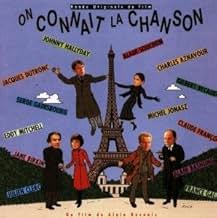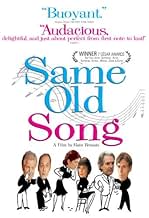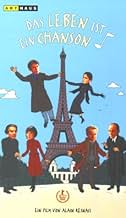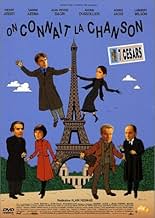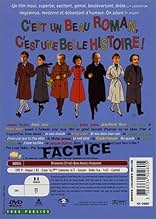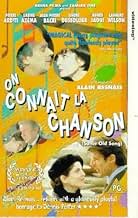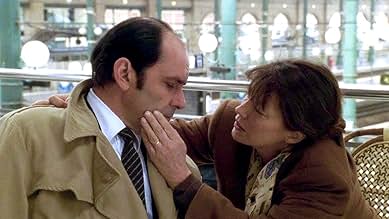On connaît la chanson
NOTE IMDb
7,3/10
4,6 k
MA NOTE
Une histoire musicale sur la façon dont les gens rencontrent l'amour dans les rues de la belle ville de Paris.Une histoire musicale sur la façon dont les gens rencontrent l'amour dans les rues de la belle ville de Paris.Une histoire musicale sur la façon dont les gens rencontrent l'amour dans les rues de la belle ville de Paris.
- Réalisation
- Scénario
- Casting principal
- Récompenses
- 10 victoires et 9 nominations au total
Avis à la une
This film, a tribute to Dennis Potter (pennies from heaven, the singing detective), is the best french comedy I've ever seen. Basically it's a typical well-made french film about relations, with great acting, set in Paris. But it's more than that: it's also a musical. Here are some reasons why I think it's a great movie. First, the chansons, play-backed by the actors, are brilliant. Imagine a Wehrmachtofficer lipsinging to an Edith-Piaf chanson (in the opening act). The best thing about the chansons, is the fact that they actually support the story, as they serve as moments of reflection and introspection for the players. Maybe it's the contrast between the extreme sentimentality and the 'serious' acting that makes this film so great. Go see it.
This film is light, but not empty. Following the interconnected lives of several Parisian bourgeois, the film uses snippets of popular music to demonstrate the emotional state of the characters in the style of a conventional musical. However, the music does both more than this and less. The characters do not sing their parts so much as lip-sync (badly) to tunes that one hears on the radio or in a movie. The songs are related to the characters' "inner lives" as a Nike swoosh or a Dior label would be - and that's the point. Each character has a musical style of sorts and maybe even a theme song, but the song "belongs" to the character like motion "belongs" to a jelly-fish. The characters, like the jelly-fish that are a motif of the finale scene, are less than unique, and much less than in control. However, they are at the same time quite human and sympathetic.
Resnais, whom I count as being one of cinema's great geniuses, has a similar approach in On connaît la chanson as he does in Mon oncle d'Amérique, with pop songs in lieu of mice and jelly-fish in lieu of Henri Laborit. (See the info on the latter movie if this doesn't make sense...) What both films do is make one think about important questions of the complex relationship between brains, minds, and souls, and they do so without clobbering the viewer over the head with preachiness and over-simplifications. Contrast this with the sermonizing of the abominable Lars von Trier (of Dancer in the Dark fame) as well as with the mindless drek that that is generally shown in U.S. theaters.
Resnais, whom I count as being one of cinema's great geniuses, has a similar approach in On connaît la chanson as he does in Mon oncle d'Amérique, with pop songs in lieu of mice and jelly-fish in lieu of Henri Laborit. (See the info on the latter movie if this doesn't make sense...) What both films do is make one think about important questions of the complex relationship between brains, minds, and souls, and they do so without clobbering the viewer over the head with preachiness and over-simplifications. Contrast this with the sermonizing of the abominable Lars von Trier (of Dancer in the Dark fame) as well as with the mindless drek that that is generally shown in U.S. theaters.
Reminiscent of Jacques Demy's 1968 "The Young Girls of Rochefort" where characters now and then burst into song (and dance) to convey the story, and Eric Rohmer's flavor of intertwined relationships and coincidental meetings of characters that wrap around a tale, Alain Resnais' treatment here in 1997 "Same Old Song" has his characters burst into lines of songs in between dialogs. Irrespective of the mix and match of a male vocal coming out of a female character or vice versa, they are excerpted strains and words chosen from certain songs that propel the storytelling. It's as if the characters are thinking aloud in songs on the situation or predicament at hand. It is rather fun once you get a sense of what Resnais was trying to deliver. Being an Alain Resnais film, intellectual exchanges and philosophical tones are never lacking.
Definitely reminded me of his treatment on 1980 "Mon oncle d'Amerique" where he has scientific mice experiment scenes juxtaposed against the human (brain) reactions to relationships and love. In this 1997 "On connait la chanson", his fascination with how people think - how the brain cells work in each of the characters, is again deftly demonstrated. At the last segment, where a theoretical explosion of the minds occur as gray matters collide - there was an appearance of a graphical ear-shape (in quiet wavy motion) in the center of it all - it's amazing to see how Resnais' mind at 75 was still so very much into studying and unraveling human emotions, offering us life lessons in love.
The story centers around two sisters, Camille the tour guide who's also writing a thesis (Agnes Jaoui) and her popular and successful sibling Odile (Sobine Azema), and four men in their lives: an old flame of Odile - Nicolas (Jean-Pierre Bacri), husband of Odile - Claude (Pierre Arditi), writer of radio plays and quiet admirer of Camille - Simon (Andre Dussollier, more casually groomed than usual), and profiteering real-estate agent of Odile, fanciful beau of Camille and arrogant boss of Simon - Marc (Lambert Wilson).
Typographically oriented, I can't help noticing the sequence of treatment to the credit roll at the end of the film: it started with a centrifugal look of the names of les chanteurs, followed by horizontal scroll from right to left of the main cast and crew, then a quick shooting upwards to facilitate the conventional bottom to top scroll of rest of the credits.
It may not be a French film for just anybody, it certainly is delightful to experience. (An Artistic License and Merchant-Ivory Films production indeed!) The subtitles, translated by Ian Burley, were super: the lyrics actually rhyme in English, e.g., "resist", "exist", "egotist"!
This film was dedicated to Dennis Potter, a cerebral genius he was. Check out his 1996 "Karaoke" (a multitude of colorfully complex characters) and "Cold Lazarus" (quite a sci-fi notion not completely implausible) - both centers around Albert Finney being the main character, and as always, a tour de force performance Finney delivered.
Definitely reminded me of his treatment on 1980 "Mon oncle d'Amerique" where he has scientific mice experiment scenes juxtaposed against the human (brain) reactions to relationships and love. In this 1997 "On connait la chanson", his fascination with how people think - how the brain cells work in each of the characters, is again deftly demonstrated. At the last segment, where a theoretical explosion of the minds occur as gray matters collide - there was an appearance of a graphical ear-shape (in quiet wavy motion) in the center of it all - it's amazing to see how Resnais' mind at 75 was still so very much into studying and unraveling human emotions, offering us life lessons in love.
The story centers around two sisters, Camille the tour guide who's also writing a thesis (Agnes Jaoui) and her popular and successful sibling Odile (Sobine Azema), and four men in their lives: an old flame of Odile - Nicolas (Jean-Pierre Bacri), husband of Odile - Claude (Pierre Arditi), writer of radio plays and quiet admirer of Camille - Simon (Andre Dussollier, more casually groomed than usual), and profiteering real-estate agent of Odile, fanciful beau of Camille and arrogant boss of Simon - Marc (Lambert Wilson).
Typographically oriented, I can't help noticing the sequence of treatment to the credit roll at the end of the film: it started with a centrifugal look of the names of les chanteurs, followed by horizontal scroll from right to left of the main cast and crew, then a quick shooting upwards to facilitate the conventional bottom to top scroll of rest of the credits.
It may not be a French film for just anybody, it certainly is delightful to experience. (An Artistic License and Merchant-Ivory Films production indeed!) The subtitles, translated by Ian Burley, were super: the lyrics actually rhyme in English, e.g., "resist", "exist", "egotist"!
This film was dedicated to Dennis Potter, a cerebral genius he was. Check out his 1996 "Karaoke" (a multitude of colorfully complex characters) and "Cold Lazarus" (quite a sci-fi notion not completely implausible) - both centers around Albert Finney being the main character, and as always, a tour de force performance Finney delivered.
I will always go out of my way - in December last year I tracked down a tiny theatre - capacity roughly 50 - in a Parisian alley to catch a performance of their 'Un air de famille' (yes, it was great, thanks for asking) to see anything written by Jean-Pierre Bacri and Agnes Jouai, and if they are performing as well, as they do in this movie, then that is icing on the cake. I tend to associate Resnais with pretentious intellectual 'popcorn' movies like Last Year At Marienbad and Hiroshima, Mon Amour so it makes a welcome change to discover that he can turn his hand to mainstream and deliver, with a little help from a great script and great acting from Bacri and Jouai, a great feel-good movie. The usual suspects - Andre Dussolier, Pierre Arditi, etc are on hand and turn in the usual above par performances. This is one to savor. 8/10
6gans
The sing-along idea is clever and well-implemented, but the story goes around in circles and above all the film is too static to support the musical premise. It's sad to see such lackluster direction from the creator of _Hiroshima mon amour_. If you like Jaoui and Bacri, go see _Le gout des autres_!
Le saviez-vous
- AnecdotesThe film is dedicated to the memory of Dennis Potter, and is in the style of Potter's lip-sync musicals like Pennies from Heaven (1978), The Singing Detective (1986) and Lipstick on Your Collar (1993).
- ConnexionsFeatured in 6 à la maison: Épisode datant du 27 janvier 2021 (2021)
- Bandes originalesJ'ai Deux Amours
Music by Vincent Scotto
Lyrics by Georges Koger and Henri Varna
Performed by Josephine Baker
Meilleurs choix
Connectez-vous pour évaluer et suivre la liste de favoris afin de recevoir des recommandations personnalisées
- How long is Same Old Song?Alimenté par Alexa
Détails
- Date de sortie
- Pays d’origine
- Site officiel
- Langues
- Aussi connu sous le nom de
- Same Old Song
- Lieux de tournage
- Hôtel Meurice - 228 Rue de Rivoli, Paris 1, Paris, France(opening scene: Camille tells about von Choltitz in front of the hotel)
- Sociétés de production
- Voir plus de crédits d'entreprise sur IMDbPro
Box-office
- Budget
- 7 900 000 € (estimé)
- Durée
- 2h(120 min)
- Couleur
- Mixage
- Rapport de forme
- 1.85 : 1
Contribuer à cette page
Suggérer une modification ou ajouter du contenu manquant

